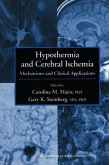Neurochemical Correlates of Cerebral Ischemia
Herausgegeben von Bazan, Nicolas G.; Braquet, Pierre; Ginsberg, Myron D.
Neurochemical Correlates of Cerebral Ischemia
Herausgegeben von Bazan, Nicolas G.; Braquet, Pierre; Ginsberg, Myron D.
- Broschiertes Buch
- Merkliste
- Auf die Merkliste
- Bewerten Bewerten
- Teilen
- Produkt teilen
- Produkterinnerung
- Produkterinnerung
In this timely volume, eminent researchers provide detailed coverage of the relevant function of neurochemical correlates to cerebral ischemia as well as their pathophysiological significance.
Andere Kunden interessierten sich auch für
![Neurochemical Correlates of Cerebral Ischemia Neurochemical Correlates of Cerebral Ischemia]() P. BraquetNeurochemical Correlates of Cerebral Ischemia60,99 €
P. BraquetNeurochemical Correlates of Cerebral Ischemia60,99 €![Brain Edema XIII Brain Edema XIII]() Hoff, J., T. / R.F. Keep / G. Xi / Y. Hua (eds.)Brain Edema XIII154,99 €
Hoff, J., T. / R.F. Keep / G. Xi / Y. Hua (eds.)Brain Edema XIII154,99 €![Brain Edema XIII Brain Edema XIII]() Brain Edema XIII150,99 €
Brain Edema XIII150,99 €![Cerebral Ischemia and Basic Mechanisms Cerebral Ischemia and Basic Mechanisms]() Cerebral Ischemia and Basic Mechanisms112,99 €
Cerebral Ischemia and Basic Mechanisms112,99 €![Hypothermia and Cerebral Ischemia Hypothermia and Cerebral Ischemia]() Hypothermia and Cerebral Ischemia82,99 €
Hypothermia and Cerebral Ischemia82,99 €![Mechanisms of Secondary Brain Damage from Trauma and Ischemia Mechanisms of Secondary Brain Damage from Trauma and Ischemia]() Mechanisms of Secondary Brain Damage from Trauma and Ischemia112,99 €
Mechanisms of Secondary Brain Damage from Trauma and Ischemia112,99 €![Mechanisms of Secondary Brain Damage from Trauma and Ischemia Mechanisms of Secondary Brain Damage from Trauma and Ischemia]() Alexander Baethmann / Jörg Eriskat / Jens Lehmberg / Nikolaus Plesnila (eds.)Mechanisms of Secondary Brain Damage from Trauma and Ischemia115,99 €
Alexander Baethmann / Jörg Eriskat / Jens Lehmberg / Nikolaus Plesnila (eds.)Mechanisms of Secondary Brain Damage from Trauma and Ischemia115,99 €-
-
-
In this timely volume, eminent researchers provide detailed coverage of the relevant function of neurochemical correlates to cerebral ischemia as well as their pathophysiological significance.
Hinweis: Dieser Artikel kann nur an eine deutsche Lieferadresse ausgeliefert werden.
Hinweis: Dieser Artikel kann nur an eine deutsche Lieferadresse ausgeliefert werden.
Produktdetails
- Produktdetails
- Advances in Neurochemistry .7
- Verlag: Springer / Springer US / Springer, Berlin
- Artikelnr. des Verlages: 978-1-4613-6458-0
- Softcover reprint of the original 1st ed. 1992
- Seitenzahl: 396
- Erscheinungstermin: 5. November 2012
- Englisch
- Abmessung: 229mm x 152mm x 22mm
- Gewicht: 572g
- ISBN-13: 9781461364580
- ISBN-10: 1461364582
- Artikelnr.: 37476327
- Herstellerkennzeichnung
- Springer-Verlag GmbH
- Tiergartenstr. 17
- 69121 Heidelberg
- ProductSafety@springernature.com
- Advances in Neurochemistry .7
- Verlag: Springer / Springer US / Springer, Berlin
- Artikelnr. des Verlages: 978-1-4613-6458-0
- Softcover reprint of the original 1st ed. 1992
- Seitenzahl: 396
- Erscheinungstermin: 5. November 2012
- Englisch
- Abmessung: 229mm x 152mm x 22mm
- Gewicht: 572g
- ISBN-13: 9781461364580
- ISBN-10: 1461364582
- Artikelnr.: 37476327
- Herstellerkennzeichnung
- Springer-Verlag GmbH
- Tiergartenstr. 17
- 69121 Heidelberg
- ProductSafety@springernature.com
1 Introduction: Current Biochemical and Molecular Approaches to the Study of Cerebral Ischemia.- 2 Metabolic Correlates of Focal Ischemia.- 3 Role of Pyruvate Dehydrogenase in Ischemic Injury.- 4 Disturbances of Protein and Polyamine Metabolism after Reversible Cerebral Ischemia.- 5 Oxygen Dependence of Neuronal Metabolism.- 6 Dysmetabolism in Lipid Brain Ischemia.- 7 Involvement of Calcium, Lipolytic Enzymes, and free Fatty acids in Ischemic Brain Trauma.- 8 Arachidonic Acid Lipoxygenase Products Participate in the Pathogenesis of Delayed Cerebral Ischemia.- 9 Biochemical Changes and Secondary Tissue Injury after Brain and Spinal Cord Ischemia!Reperfusion.- 10 Free Fatty Acid Liberation in the Pathogenesis and Therapy of Ischemic Brain Damage.- 11 Cerebral Ischemia and Polyphosphoinositide Metabolism.- 12 Protection Against Ischemic Brain Damage by Excitatory Amino Acid Antagonists.- 13 Acute Alterations in Phosphoinosttide Turnover.- 14 New Insights into the Role of Oxygen Radicals in Cerebral Ischemia.- 15 Biochemical Factors and Mechanisms of Secondary Brain Damage in Cerebral Ischemia and Trauma.- 16 Modulators of Neural Cell Signaling and Triggering of Gene Expression Following Cerebral Ischemia.- 17 Cellular and Metabolic Significance of Cellular Acid-Base Shifts in Human Stroke.
1 Introduction: Current Biochemical and Molecular Approaches to the Study of Cerebral Ischemia.- 2 Metabolic Correlates of Focal Ischemia.- 3 Role of Pyruvate Dehydrogenase in Ischemic Injury.- 4 Disturbances of Protein and Polyamine Metabolism after Reversible Cerebral Ischemia.- 5 Oxygen Dependence of Neuronal Metabolism.- 6 Dysmetabolism in Lipid Brain Ischemia.- 7 Involvement of Calcium, Lipolytic Enzymes, and free Fatty acids in Ischemic Brain Trauma.- 8 Arachidonic Acid Lipoxygenase Products Participate in the Pathogenesis of Delayed Cerebral Ischemia.- 9 Biochemical Changes and Secondary Tissue Injury after Brain and Spinal Cord Ischemia!Reperfusion.- 10 Free Fatty Acid Liberation in the Pathogenesis and Therapy of Ischemic Brain Damage.- 11 Cerebral Ischemia and Polyphosphoinositide Metabolism.- 12 Protection Against Ischemic Brain Damage by Excitatory Amino Acid Antagonists.- 13 Acute Alterations in Phosphoinosttide Turnover.- 14 New Insights into the Role of Oxygen Radicals in Cerebral Ischemia.- 15 Biochemical Factors and Mechanisms of Secondary Brain Damage in Cerebral Ischemia and Trauma.- 16 Modulators of Neural Cell Signaling and Triggering of Gene Expression Following Cerebral Ischemia.- 17 Cellular and Metabolic Significance of Cellular Acid-Base Shifts in Human Stroke.








